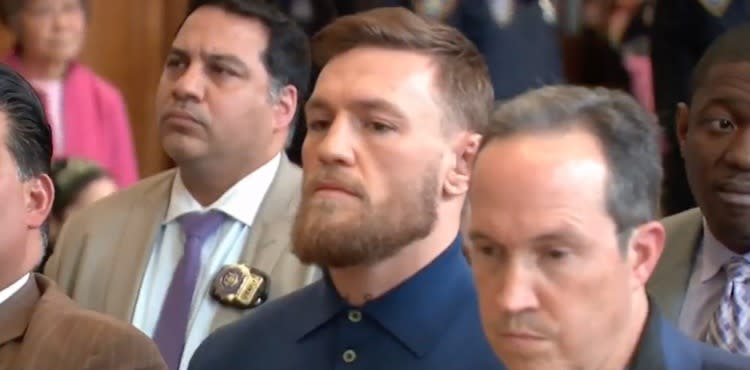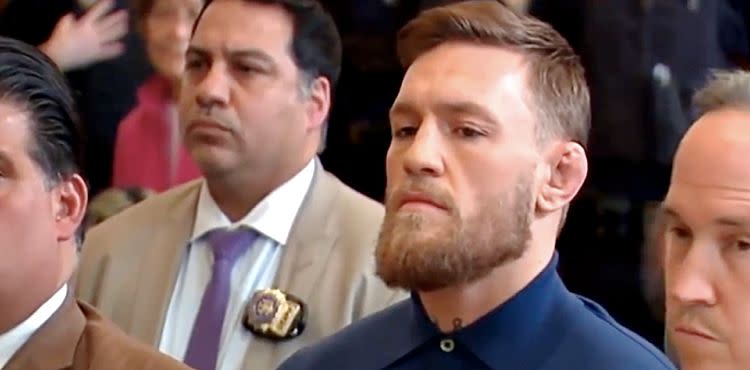Trial Attorney Explains What to Expect in Conor McGregor Court Case

Conor McGregor will return to the courtroom this Thursday in New York for the first hearing regarding his assault on a bus in Brooklyn from April just ahead of UFC 223.
The entire altercation unfolded like a bad reality show, as McGregor showed up in New York seeking retribution after reigning lightweight champion Khabib Nurmagomedov was involved in an incident earlier in the same week with the Irishman's teammate, Artem Lobov.
What Exactly Did Conor McGregor's Melee Entail on April 5?
McGregor and numerous friends stormed into the Barclays Center in Brooklyn where they laid waste to a bus holding several UFC fighters, while calling out Nurmagomedov and his team. McGregor was seen on video tossing trash cans and a moving dolly that shattered a back window, ultimately injuring both Michael Chiesa and Ray Borg and subsequently knocking them off the UFC 223 card two days later.
McGregor was ultimately arrested and charged with three misdemeanor assaults and a felony charge for criminal mischief for the property damage done during the melee.
The next hearing on the matter will take place on June 14, although it's not likely McGregor's case will be settled on that date. According to seasoned trial attorney Bob Latham, who has been recognized multiple times as one of the best lawyers in America, while also previously serving on the United States Olympic Committee board of directors, he doesn't expect McGregor's case to get wrapped up quite so fast.
What to Expect From Conor McGregor's First Court Appearance
Instead, Latham predicts that the prosecutors will be getting the final charges settled against McGregor before attorneys will begin working on a plea deal to settle the criminal case.
"Not all that much really," Latham said when asked what will happen on June 14. "I think the main thing coming out of it will be we and he will know the full scope of charges and whether there have been grand jury indictments or where the process stands in regards to the felony. That in turn will go a long ways to deciding what potential plea deals might be on the able from the prosecution.
"If the felonies are still part of the case, then you're looking at perhaps trying to arrive at a plea along the misdemeanor scale. If the felonies are not going to continue to be part of the case, then you're probably looking at a plea deal that is on the lower end of the misdemeanor scale."
Latham adds that there is a possibility that McGregor's attorneys have already reached a plea deal with the prosecution, although it seems unlikely at this time.
"I suppose if people have been working behind the scenes then there's an outside chance, but I don't get that impression," Latham said. "I think this is just another stop. You have some particular factors that I think the judge wants to make sure they have control over the case. You've got a guy who lives in Ireland, they've not taken his passport away, they want to make sure that he still feels the authority of the court, I'd imagine, thus his personal presence.
"But I don't think you're going to have any resolution, but you'll have more information that both parties and pundits and everyone alike to assess where this is heading."
What Are the Chances Conor McGregor Faces Jail Time?
While Thursday's hearing may be more about procedure than resolution, Latham says that judging by the charges McGregor is currently facing, it's highly unlikely that he'll ever see the inside of a jail cell.
"I think you'd be looking at a plea deal that would avoid jail time," Latham said. "That's really the essence of it. You've got a man who could afford to pay restitution. You'd want him to show some societal remorse, so there might be a community service component to it. But I think that's what you'll be looking at for ultimate resolution. I doubt he'd be looking at jail time."
As far as McGregor's immigration status, which could affect his ability to travel in and out of the United States, which is where the majority of his fight career takes place, Latham says it's highly unlikely that will play a part.
If the one felony charge is reduced to a misdemeanor, Latham doesn't see any reason why McGregor's immigration status would even potentially be at risk, but his attorneys will likely ensure that during any plea deal.
"There's always that risk, but I think it's a low-level risk," Latham said. "I think that would be part of any broader deal to make sure that anything he pleas to will not affect his immigration status."
The other factor that might hinder McGregor after the criminal proceedings are wrapped up is his ability to compete in the state of New York.
The New York State Athletic Commission would have to license McGregor to compete there again, but Latham doesn't see that being a huge issue going forward.
If McGregor only faces misdemeanor charges in the end, Latham can't believe that the commission would somehow hold that against him in licensing and even if they do, there are plenty of states that would gladly license him to fight.
"I think you have to be conscious of that, but he can always find a place to fight somewhere," Latham said. "I think, especially without a conviction on the felony, and it's a plea that relates to misdemeanors, then I don't expect he would face any trouble with the licensing commission. Again, that's something that I think needs to be worked out. I think in connection with his plea deal, there may be discussions with the commission on that, but generally speaking, the secondary issues of his licensing and immigration status will fall in line with whatever plea deal he gets."



